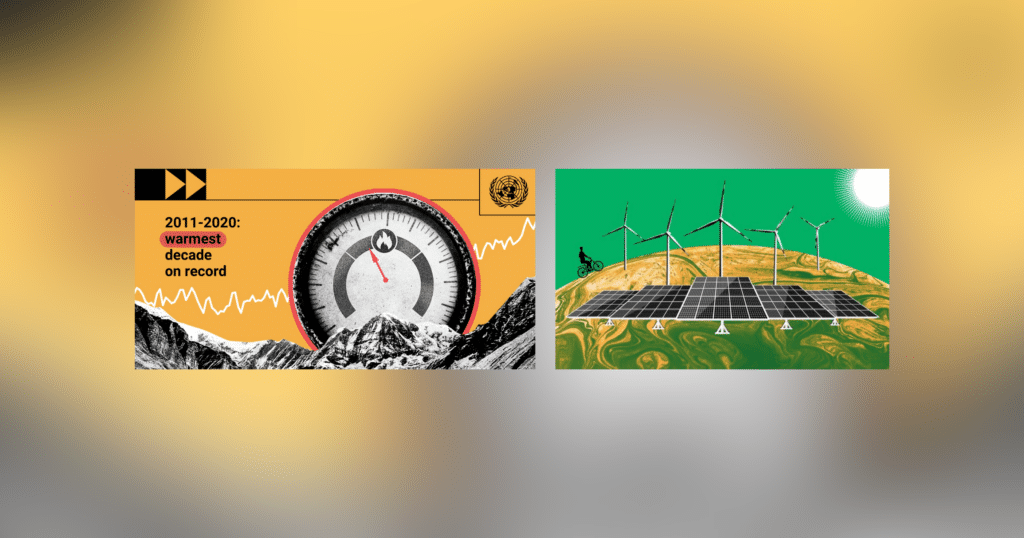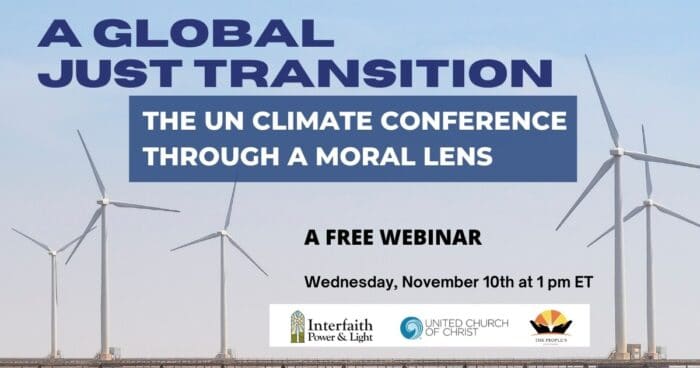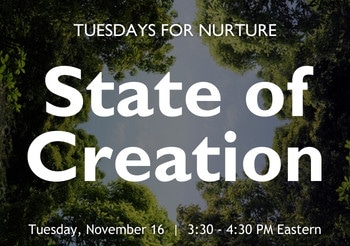Temperatures rise, and so do the faithful, calling on world leaders to act
“It’s simple,” said U.S. President Joe Biden. “Will we act? Will we do what is necessary? Will we seize the enormous opportunity before us? Or will we condemn future generations to suffer?”
He spoke Monday, Nov. 1, on the second day of a world summit on climate change. Faith leaders are speaking out, too. Some are in Glasgow, Scotland, for the “COP 26” climate meeting. Others are back in their home countries. United Church of Christ people are among them.
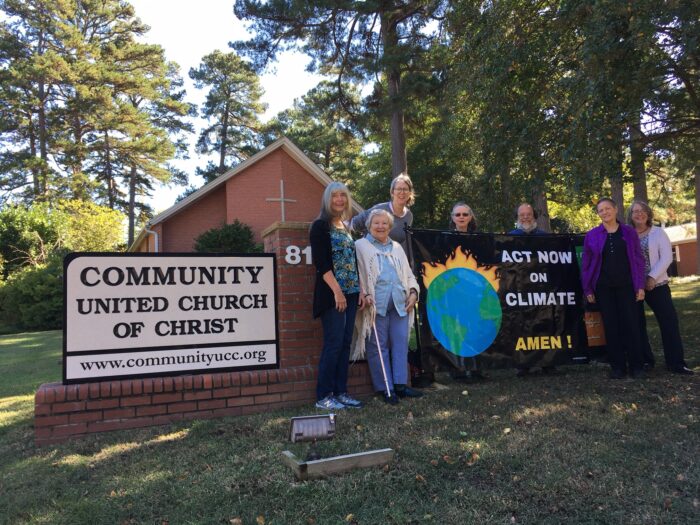
The current global climate crisis, marked by fire, flood, drought and other disasters, is, to be sure, a policy question for nations. COP 26 has gathered leaders like Biden to focus on slowing global warming. Their meeting is called “COP” because it is a “Conference of the Parties” to a United Nations Climate Convention. They’ve met yearly since signing the Convention in 1992 (thus, “26”).
The U.N. said it expected “more than 190 world leaders” at the 12-day conference, “along with tens of thousands of negotiators, government representatives, businesses and citizens.”
Faith on ‘front lines’
But people of faith say it’s also a moral and ethical issue. On the summit’s opening day, Oct. 31, Interfaith Scotland gathered the many faith leaders present in Glasgow to pray in the city’s main public square.
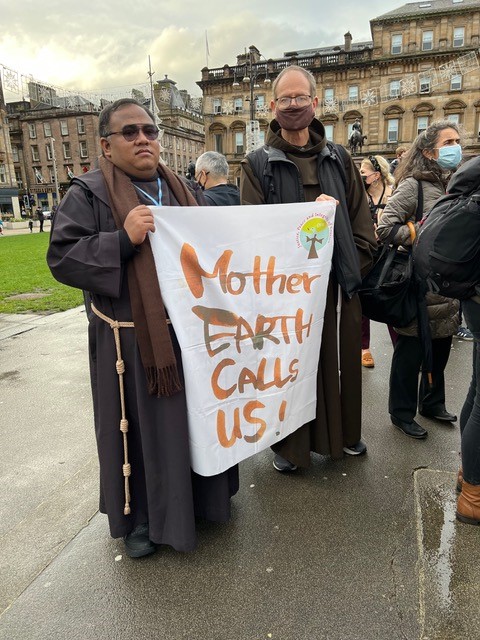
One of them was the Rev. Susan Hendershot, president of the U.S. nonprofit Interfaith Power and Light. She said she and other religious leaders are in Glasgow “to be sure that global leaders understand that the climate crisis is a moral and ethical issue that needs to be solved with ambition and solidarity.” Hendershot, a Christian Church (Disciples of Christ) minister, attends First Congregational UCC in Berkeley, Calif.
“Communities of faith have long been working on issues that are interconnected with the climate crisis, whether food security, global migration and displacement of people, care for Creation, or any of a myriad of other issues,” she said. “We have been on the front lines of care for those who have been made vulnerable in our communities, acting with charity and justice.”
‘Spiritual strength to act now’
Leaders back home are also urging the church to pay attention.
“Not since the Paris Climate Agreement in 2015 has there been a U.N. climate conference as important as this one,” said the Rev. Brooks Berndt, UCC minister of environmental justice. “In a world where global inequality is thoroughly enmeshed with a climate crisis, there are a number of key moral questions at stake. Of central importance is whether wealthy countries will stop investing in fossil fuels and start investing in a clean and just transition to renewable energy.”
He and the Rev. Michael Malcom, the UCC minister who heads Alabama IPL and the People’s Justice Council, are gathering climate policy experts for a Nov. 10 webinar. It’s titled “A Global Just Transition: The U.N. Climate Conference through a Moral Lens.” People can register here.
As with the vigil in Glasgow, many current calls for climate action cut across lines of faith. Berndt helped organize an interfaith event in downtown Cleveland Oct. 28 (see related story). It focused on proposed U.S. social spending that would include, among other things, funding for clean energy.
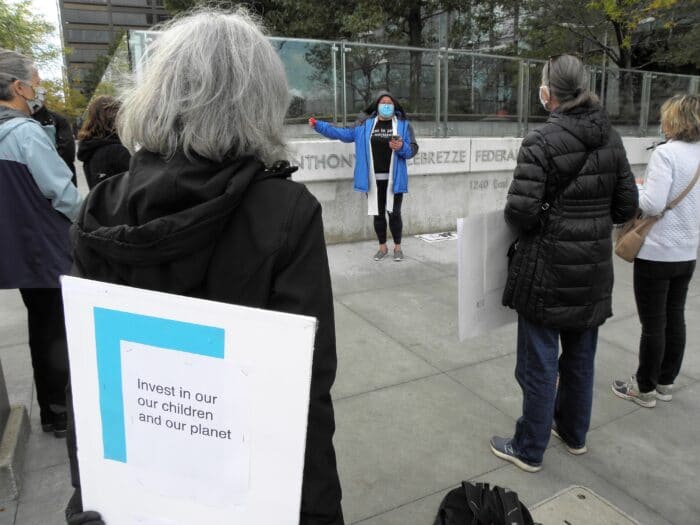
And in Raleigh, N.C., Community UCC co-hosted a socially distanced, outdoor demonstration Oct. 18. Gathered by a group called Interfaith Creation Care of the Triangle, some 200 people stretched out along Raleigh’s Wade Avenue, holding signs calling for climate action. The point, as Community UCC’s Facebook page put it, was “to call on our national political leaders at the COP meeting in Glasgow to commit to immediate action and vigorous targets.” It was part of a weekend “focusing on the spiritual strength to act now on climate.”
Religious leaders’ ‘moral duty’
Clergy and laity have a special reason to speak out, said a UCC special advisor on climate justice. “Because over 80% of the world’s population is religious, it’s essential for people of faith to add their voices, their assets and their bodies to the climate movement,” said the Rev. Jim Antal, who advises General Minister and President John Dorhauer. Antal will be featured in a Nov. 16 UCC webinar, “The State of Creation,” discussing the role of people of faith. People can register here.
“Every religious leader has a moral duty to preach on the climate crisis,” Antal said. “If people of faith can fully face the reality of the climate crisis, humanity will successfully undertake the unprecedented transitions that science says we must, and technology says we can.”
Related News
A Prophetic Call for Justice and Peace in Palestine
The executive leaders of the United Church of Christ have issued the following statement...
Read More‘Love is Greater Than Fear’: Regional Youth Events get to the heart of gospel message
United Church of Christ teens attending this summer’s Regional Youth Events (RYE) are...
Read MoreUCC desk calendars available to order now
Prepare for your day, month and year with the United Church of Christ desk calendar —...
Read More